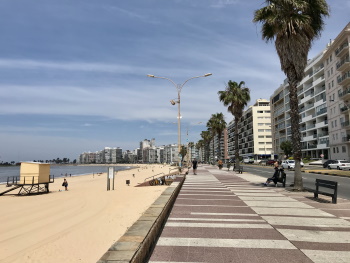La Rambla de la Cité de Montevideo

La Rambla (promenade maritime) de la Cité de Montevideo is part of the Tentative list of Uruguay in order to qualify for inclusion in the World Heritage List.
La Rambla is the maritime promenade of Montevideo. It has a large number of architectural works from different periods, including hotels and casino’s. The Rambla Sur segment from the 1930s is a “balcony on the sea”.
Map of La Rambla de la Cité de Montevideo
Load mapThe coordinates shown for all tentative sites were produced as a community effort. They are not official and may change on inscription.
Community Reviews
Els Slots

The occurrence of Montevideo’s Rambla on Uruguay’s Tentative List is an easy object of ridicule – haven’t we all seen Ramblas/Corniches/Promenades before at various places around the world? The List may even have enough already of them to warrant a (new) connection, depending on the criteria used: the Promenade des Anglais in Nice, Marine Drive in Mumbai (partly inscribed), the pedestrian-only Paseo del Morro in San Juan and the Terrasse Dufferin in Quebec are candidates. Havana’s Malecon I believe is outside of the core zone.
The Rambla of Montevideo stands out for two reasons: it is possibly the longest of them all (22km) and it is devoid of ornamentation. The Rambla was designed as a coastal bypass during the time the number of automobiles on the road surged (1920s) and as a means to beautify the city. ‘Ugly’, poor neighbourhoods had to go. “Stripping of ornaments, the regularity of the forms, the harmony of the proportions” were essential to the modernist design of the Rambla.
I walked some 4km of the part that is known as the Rambla Sur. It felt longer as there was no shade, and there were hardly any other people present in the early afternoon. Ramblas generally are better enjoyed approaching sunset. There indeed is no ornamentation – just a wide sidewalk for cyclists and pedestrians, bordered on the land side by a multi-lane road and on the riverside by a low wall that can be used as a bench. This wall, “a balcony overlooking the sea”, is made of ‘classy’ pink granite and uniform in design all the way.
I don’t see this becoming a WHS on its own, but it could be combined with that other Montevideo TWHS about early 20th-century modernist architecture. It was a product of the same period and the same wish to create recreational areas for the population as the Parque Batlle y Ordoñez.
Read more from Els Slots here.
Assif
La Rambla is a 22 km long promenade along the Rio de la Plata in Montevideo and is claimed to be one of the longest in the world. It features several beaches and is very popular among the locals despite being a major traffic artery with high levels of air and noise pollution. Along the Rambla there aren't many historic monuments from the time of its construction in the 1920's. Some notable exceptions are Hotel Carrasco, Yacht Club Uruguayo at Buceo Port, both major Art Deco buildings, and the Zoological Museum in neo-moorish style. The Rambla is easily accessible from the city centre and is designed for pedestrians. It is nice to walk along, but I found the busy traffic unpleasant and compromising the potential quality of this leisure oriented site. The Rambla is a recognised historic monument of a uniform design, but across the major road most of the buildings are new, which would probably hamper authenticity. Moreover, I cannot see any OUV here. In its official description the Rambla is compared to similar waterside promenades in France, Belgium, Spain, Cuba and Brazil, which explains its cultural context, however, I can hardly see what would make Montevideo stand out among the other sites mentioned in the comparative analysis.
Community Likes
Site Info
- Full Name
- La Rambla (promenade maritime) de la Cité de Montevideo
- Country
- Uruguay
- Added
- 2010
- Type
- Cultural
- Categories
- Human activity - Urban planning
- Link
- By ID
Site History
2010 Added to Tentative List
Site Links
Visitors
58 Community Members have visited.